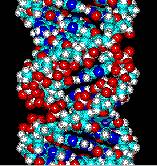
THURSDAY, Oct. 18 (HealthDay News) — People with significant symptoms of depression and shortened telomeres — pieces of DNA that protect the ends of chromosomes from deterioration — are at greater risk of death from bladder cancer, new research suggests.
The findings were scheduled for presentation Wednesday at the annual cancer prevention conference of the American Association for Cancer Research, in Anaheim, Calif.
“We found that patients with bladder cancer with shorter telomeres and high levels of depression symptoms have a threefold increased risk for mortality,” Meng Chen, an epidemiologist at the University of Texas MD Anderson Cancer Center, in Houston, said in an association news release.
In conducting the study, the researchers analyzed medical and psychological information on nearly 500 patients with bladder cancer. The participants’ level of depression was rated on a standard scale: Patients without symptoms of depression had a score below 16 and those with a score of 16 or greater were considered depressed.
Patients who scored as depressed had an average survival time of 58 months, the study found. In comparison, patients with scores below 16 had an average survival time that exceeded 200 months. Depressed patients had a 1.89 times higher risk of death from all causes than those who were not depressed.
The researchers used patients’ blood samples to measure the length of the their telomeres, a marker of aging that is linked to cancer. Patients with depression symptoms and short telomeres had more than a three times higher risk for death and a much shorter period of disease-free survival.
Although the study authors said more research is needed to further investigate their findings, they suggested that psychological factors may play an important role in the survival of people with cancer, along with lifestyle factors that could slow the shortening of telomeres, such as exercise and weight loss.
“In terms of building a prediction model for bladder cancer mortality, current models only focus on clinical variables, such as treatment and tumor stage and grade,” Chen said. “Our study suggests that psychological factors and perhaps lifestyle changes could be included in this prediction model.”
The study found an association between depression, DNA changes and death after bladder cancer. It did not prove a cause-and-effect relationship. The data and conclusions should be viewed as preliminary until published in a peer-reviewed medical journal.
More information
The U.S. National Cancer Institute has more about bladder cancer.

